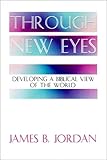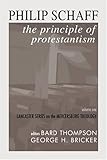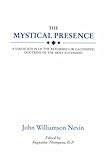OK, the rather lengthy title is there for a reason.
First an apology: I don’t mean to be sectarian. Ideally the subject matter of these books should be grasped by every Christian, period. But most of them are written to a certain audience and make certain assumptions about them. So I’m trying to aim these books were I think they would be best received. [Similar apology for “Anglo-American.”]
I do mean to include “Reformed Baptists,” by the way. “Calvinism” is spreading relatively rapidly among Bible-believing Christians, from what I hear (I’m not going to take the time to link the news reports). I think these five books are the ones they all need to read. I started thinking about this blog with two in mind, but realized a few more were necessary. Still, I also tried to keep the list as short as possible. There are other books that would be helpful, but these I consider the minimal core and also to be “primary sources” in what they communicate.
Finally, why am I addressing “bookworms”? Because that is a more honest and helpful designation than the self-serving term currently in vogue: theologians. Has there ever been a more casually arrogant word than “theologian” among Christian laymen? We have somehow trained productive people who actually have better things to do with their lives than read lots of books, pontificate, and argue, to diminish themselves before the exalted label.
I hear people say, “He’s no theologian but he’s a godly man.” What does this mean? Typically, one or more of the following:
- He is no longer a college student.
- He has a real job that takes up his time and concentration.
- He doesn’t blog.
- He doesn’t start arguments in chat rooms.
- He doesn’t read a lot of theological books (just as Solomon would advise).
I guess what has happened is that respect for the calling of pastor (good thing) has generated a lay-custom of imitating some visible (and very sedentary) aspects of that calling. But in my opinion this doesn’t work. And it actually leads to disrespect since everyone starts thinking they can do it too, as a hobby. Pastors are not paid hobbyists.
But I pass no judgment on bookworms. There are worse things to be. The main issue I have is that a bookworm who reads theology not think he is a better bookworm than the one who reads Stephen King.
But if you are one, and want to read important theological books. Here is the list:
 The reason you need to read this book is because in typical Christian circles far too much time and energy is spent on a philosophical appropriation of the Biblical text, one that actually leaves most of the real content of the Biblical text on the cutting room floor. If you look at a systematic theology compare to the Bible, they are obviously completely different kinds of literature. Why? Why does God communicate to us in the form that he does? What is the reason why we need to know that the garden was at the east of Eden and that it was the source of four rivers? This book is about really being open to how the Bible is structured and what images it uses and why. It will be revolutionary to the average Evangelical reader.
The reason you need to read this book is because in typical Christian circles far too much time and energy is spent on a philosophical appropriation of the Biblical text, one that actually leaves most of the real content of the Biblical text on the cutting room floor. If you look at a systematic theology compare to the Bible, they are obviously completely different kinds of literature. Why? Why does God communicate to us in the form that he does? What is the reason why we need to know that the garden was at the east of Eden and that it was the source of four rivers? This book is about really being open to how the Bible is structured and what images it uses and why. It will be revolutionary to the average Evangelical reader.
 While Reformed thought is spreading, there is talk (I’m not sure how accurate it really is) about increasing numbers of defections from Reformed orthodoxy to Roman Catholicism or Eastern Orthodoxy. I think it is also safe to say that Roman Catholic and Eastern Orthodox apologist have become more persuasive in the last few decades. To the extent such defections are caused by genuine issues and questions, The Principle of Protestantism is the immunization. Often Reformed and Protestant apologists actually make Rome or Byzantium look more attractive. Schaff, whatever his faults, takes church history seriously. While there are some artificialities in his analysis (Hegelian thesis-antithesis expectations), those are easily overlooked and don’t spoil the amazing value of this work. This won’t just make you stay Reformed. It will make you a better Christian–to the extent that a book can do such a thing.
While Reformed thought is spreading, there is talk (I’m not sure how accurate it really is) about increasing numbers of defections from Reformed orthodoxy to Roman Catholicism or Eastern Orthodoxy. I think it is also safe to say that Roman Catholic and Eastern Orthodox apologist have become more persuasive in the last few decades. To the extent such defections are caused by genuine issues and questions, The Principle of Protestantism is the immunization. Often Reformed and Protestant apologists actually make Rome or Byzantium look more attractive. Schaff, whatever his faults, takes church history seriously. While there are some artificialities in his analysis (Hegelian thesis-antithesis expectations), those are easily overlooked and don’t spoil the amazing value of this work. This won’t just make you stay Reformed. It will make you a better Christian–to the extent that a book can do such a thing.
(Full disclosure: to save time I’m plagiarizing my Amazon review from many years ago).
Here’s the myth: Roman Catholicism invents the idea that the Sacrament of the Lord’s Supper actually conveys grace. This eventually becomes the superstition of Transubstantiation. Then Luther and Calvin rise up and liberate the masses from such belief in magic. Luther never quite liberates himself, but Calvin gives us Luther’s justification by faith undergirded by nothing more than hard-core predestinarianism. The sacraments are simply symbols, pictures, and/or dramatizations of a spiritual truth designed to bring it into the participant’s remembrance.
Nevin’s _The Mystical Presence: A Vindication of the Reformed or Calvinistic Doctrine of the Holy Eucharist_ was a reality check for American Evangelicalism. He demonstrated that the assumption of American “puritans” that their heritage came from sixteenth-century Geneva was purely a delusion. Calvin believed and taught repeatedly and emphatically that believers truly partook of Christ’s flesh and blood in the Lord’s Supper. The idea that the Eucharist was merely a symbol was a complete abomination in Calvin’s eyes.
Nevin’s makes his case masterfully. He quotes copiously from Calvin to show that His view of the real presence of Christ in the rite was not an obsure part of his teaching but an essential componant of his theology. He also explains how Calvin’s view of the Eucharist was essential to his soteriology. For Calvin, a person is not saved from the wrath of God simply because God imputes “in a merely outward way” Christ’s righteousness to him. A person is saved because he is incorporated into Christ’s human body so that he is more intimately bound to Christ than a branch to a tree, a member of a body to his head, or a human to Adam. Only those united to Christ in this way by the power of the Holy Spirit can benefit from Christ’s righteousness, having it imputed to them as His glorified human life is imparted to them.
The Lord’s Supper, says Nevin, according to Calvin and the other sixteenth-century Reformers, renews and strengthens this union. We are truly given Christ’s human body by the Holy Spirit when we partake of the Sacrament. Anything less would not be sufficient for our salvation and sanctification.
Nevin carefully distinguishes Calvin’s view not only from the socinians and other rationalists, but from that of traditional Lutherans and Roman Catholics. Regarding the former, Nevin must have made his contemporary Evangelical readers wince when he pointed out that their view was identical to that of unitarians and other liberals of the day. On the other hand, unlike tran- and consubstantiation, Calvin’s view did not allow for actual material particles to be locally present in the elements or to pass into the bodies of partakers.
Probably one of the most difficult aspects of Calvin’s view was his insistence on a real participation in Christ’s flesh and blood without any matter being transported into the participant. Thus, Nevin’s attempt to formulate and improve on Calvin’s explanation is perhaps one of the most valuable aspects of the book. Nevin make the rather obvious but head-aching comment that a physical organism does not consist in particular physical particles! Living human beings pass out and ingest new particles all the time. Our human body is actually a “law” or “force” which must have matter to exist but is not identical with it. An acorn is considered identical to the oak tree which grows from it, but the oak tree is exponentially more massive and probably does not possess one material particle in common with the acorn from which it originated. By these analogies Nevin clears away the conceptual difficulties which make Calvin’s view hard to believe. It would do no good if mere dead particles from Christ’s flesh were transported into us. What we need is Christ’s life. By the power of the Holy Spirit, Christ’s resurrected, glorified, human life is given to us so that we become sharers in it.
There is much else of value in Nevin’s work, more than I can recite from memory as I punch out this brief review. Perhaps the most questionable portion of Nevin’s work is his exegesis. There he makes statements about the incarnation which are hard to makes sense of. On the other hand, the texts he uses are very similar to those used by Richard Gaffin in Resurrection & Redemption: A Study in Pauline Soteriology. In other words, Nevin was a century ahead of the cutting edge of conservative Reformed scholarship. The difference is that Gaffin concentrates on the Resurrected humanity of Christ, instead of the “theanthropic person” which concerns Nevin almost exclusively and in my opinion leads to some difficulties.
Anyone claiming to be Evangelical and/or Reformed needs to read this book. There is simply nothing else like it. You will never be the same again.
 This is the tract to proclaim liberty to Western Christians from their Cartesian prisons. Don’t be fooled by the small size and don’t think you can read through it quickly. Wittgenstein said his writings were meant to be read slowly, and I think that applies to this book as well. Peter Leithart is basically writing against Christianity in order to defend the Church. To think of what Jesus did and founded and spreads primarily as the spread of special ideas is crippling to the Church in many ways. Jesus had ideas but he came to do things and start things that are not reducible to ideas. Nor are they simply the consequences of ideas. To even think of “Christian culture” as the “embodiment” of the Christian faith is fraught with problems, since Jesus started and actual culture, the Church, from the begining. There was no time in which ideas were bantered around and then later “applied” to life. Jesus, from the incarnation onward (and as Israel before) was alway a communal life, not an ideology. Read the book!
This is the tract to proclaim liberty to Western Christians from their Cartesian prisons. Don’t be fooled by the small size and don’t think you can read through it quickly. Wittgenstein said his writings were meant to be read slowly, and I think that applies to this book as well. Peter Leithart is basically writing against Christianity in order to defend the Church. To think of what Jesus did and founded and spreads primarily as the spread of special ideas is crippling to the Church in many ways. Jesus had ideas but he came to do things and start things that are not reducible to ideas. Nor are they simply the consequences of ideas. To even think of “Christian culture” as the “embodiment” of the Christian faith is fraught with problems, since Jesus started and actual culture, the Church, from the begining. There was no time in which ideas were bantered around and then later “applied” to life. Jesus, from the incarnation onward (and as Israel before) was alway a communal life, not an ideology. Read the book!
 I have read this book at least six times (more I think, but I lose track). This is the best and most understandable book about how to relate the Bible as the authority for a Christian to other authorities, including the authority of theology and philosophy. John Frame leads readers to think about what it means that Jesus is the Lord of our knowledge (knowledge, traditionally defined as justified true belief, is an ethical undertaking involving respect for norms). It is a great elaboration of John Calvin’s insight (and that of many other Christians, I suspect) that knowledge of God is the key to knowledge of ourselves and of our world. It looks like a long book, but John Frame’s cogent writing makes time and pages fly as you read. This book not only show how to do original and creative work in a thoroughly faithful and orthodox context, but is itself and example of such work. And, even more, the author’s own Christian humility come through on every page. It is a great work from a great Christian.
I have read this book at least six times (more I think, but I lose track). This is the best and most understandable book about how to relate the Bible as the authority for a Christian to other authorities, including the authority of theology and philosophy. John Frame leads readers to think about what it means that Jesus is the Lord of our knowledge (knowledge, traditionally defined as justified true belief, is an ethical undertaking involving respect for norms). It is a great elaboration of John Calvin’s insight (and that of many other Christians, I suspect) that knowledge of God is the key to knowledge of ourselves and of our world. It looks like a long book, but John Frame’s cogent writing makes time and pages fly as you read. This book not only show how to do original and creative work in a thoroughly faithful and orthodox context, but is itself and example of such work. And, even more, the author’s own Christian humility come through on every page. It is a great work from a great Christian.

Pingback: PRAYtheREVOLUTION Posts about Holy Spirit as of August 26, 2009
On theological books, I just finished and highly recommend The Nature of Confession. It’s a set of papers from a conference on George Lindbeck and the dialogue between evangelicals and “post-liberals”. While several of the articles make similar points, I thought they each had valuable things to say. George Hunsinger’s piece specifically recommended a return to Mercersburg theology as a helpful way forward.
Good list and good disclaimer. The Web is full of people who consider themselves experts in theology, economics, medicine, foreign policy, etc. This is a great post.
Pingback: Twitter Trackbacks for Mark Horne » Blog Archive » 5 books every Anglo-American Evangelical Reformed Bookworm should read [hornes.org] on Topsy.com
Pingback: Five Books Every Anglo-American Evangelical Reformed Bookworm Should Read « St. Stephen House
Thank you Mark for the list. I only have two of them, that by Jordan and Frame. I am from the Philippines and the three seminaries I checked here don’t have the other three books you recommended.